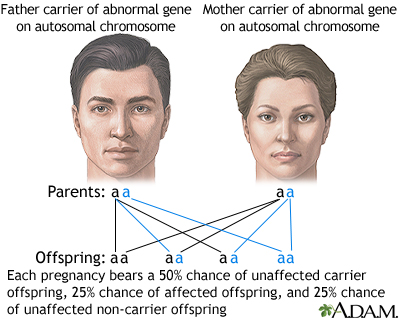Tay-Sachs disease
GM2 gangliosidosis - Tay-Sachs; Lysosomal storage disease - Tay-Sachs disease
Tay-Sachs disease is a life-threatening disease of the nervous system passed down through families.

The central nervous system comprises the brain and spinal cord. The peripheral nervous system includes all peripheral nerves.

Autosomal recessive is one of several ways that a trait, disorder, or disease can be passed down through families. An autosomal recessive disorder means two copies of an abnormal gene must be present in order for the disease or trait to develop. For a child born to a couple who both carry the gene (but do not have signs of disease), the expected outcome for each pregnancy is: a 50% chance that the child is born with one normal and one abnormal gene (carrier, without disease), a 25% chance that the child is born with two normal genes (normal), and a 25% chance that the child is born with two abnormal genes (at risk for the disease). Note: These outcomes do not mean that the children will definitely be carriers or be severely affected.
Causes
Tay-Sachs disease occurs when the body lacks hexosaminidase A. This is a protein that helps break down a group of chemicals found in nerve tissue called gangliosides. Without this protein, gangliosides, particularly ganglioside GM2, build up in cells, often nerve cells in the brain.
Tay-Sachs disease is caused by a variant gene on chromosome 15. When both parents carry the variant Tay-Sachs gene, a child has a 25% chance of developing the disease. The child must receive two copies of the variant gene, one from each parent, in order to become sick. If only one parent passes the variant gene to the child, the child is called a carrier. They will not be sick, but may pass the disease to their own children.
Anyone can be a carrier of the Tay-Sachs gene. But, the disease is most common among people with Ashkenazi Jewish ancestry, where 1 in every 27 people carries the Tay-Sachs gene.
Tay-Sachs disease is divided into infantile, juvenile, and adult forms, depending on the symptoms and when they first appear. Most people with Tay-Sachs have the infantile form. In this form, the nerve damage usually begins while the baby is still in the womb. Symptoms usually appear when the child is 3 to 6 months old. The disease tends to get worse very quickly, and the child usually dies by age 4 or 5.
Late-onset Tay-Sachs disease, which affects adults, is very rare.
Symptoms
Symptoms may include any of the following:
- Deafness
- Decreased eye contact, blindness
- Decreased muscle tone (loss of muscle strength), loss of motor skills, paralysis
- Slow growth and delayed mental and social skills
- Dementia (loss of brain function)
- Increased startle reaction
- Irritability
- Listlessness
- Seizures
Exams and Tests
Treatment
There is no treatment for Tay-Sachs disease itself, only ways to make the person more comfortable.
Support Groups
The stress of illness may be eased by joining support groups whose members share common experiences and problems. The following groups can provide more information on Tay-Sachs disease:
- National Organization for Rare Disorders --
rarediseases.org/rare-diseases/tay-sachs-disease - National Tay-Sachs and Allied Diseases Association --
www.ntsad.org - MedlinePlus --
medlineplus.gov/genetics/condition/tay-sachs-disease/
Outlook (Prognosis)
Children with this disease have symptoms that get worse over time. They usually die by age 4 or 5.
Possible Complications
Symptoms appear during the first 3 to 10 months of life and progress to
When to Contact a Medical Professional
Go to the emergency room or call 911 or the local emergency number if:
- Your child has a seizure of unknown cause
- The seizure is different from previous seizures
- The child has difficulty breathing
- The seizure lasts longer than 2 to 3 minutes
Contact your provider for an appointment if your child has other noticeable behavioral changes.
Prevention
There is no known way to prevent this disorder once someone is born. Genetic testing can detect if you are a carrier of the gene for this disorder. If you or your partner is from an at-risk population, you may wish to seek genetic counseling before starting a family.
If you are already pregnant, testing the amniotic fluid can diagnose Tay-Sachs disease in the womb.
References
Dugoff L, Wapner RJ. Prenatal diagnosis of congenital disorders. In: Lockwood CJ, Copel JA, Dugoff L, et al, eds. Creasy and Resnik's Maternal-Fetal Medicine: Principles and Practice. 9th ed. Philadelphia, PA: Elsevier; 2023:chap 30.
Hamosh A. The molecular, biochemical, and cellular basis of genetic disease. In: Cohn RD, Scherer SW, Hamosh A, eds. Thompson and Thompson Genetics and Genomics in Medicine. 9th ed. Philadelphia, PA: Elsevier; 2024:chap 13.
Kwon JM. Neurodegenerative disorders of childhood. In: Kliegman RM, St. Geme JW, Blum NJ, et al, eds. Nelson Textbook of Pediatrics. 22nd ed. Philadelphia, PA: Elsevier; 2025:chap 617.
Version Info
Last reviewed on: 11/6/2024
Reviewed by: Anna C. Edens Hurst, MD, MS, Associate Professor in Medical Genetics, The University of Alabama at Birmingham, Birmingham, AL. Review provided by VeriMed Healthcare Network. Also reviewed by David C. Dugdale, MD, Medical Director, Brenda Conaway, Editorial Director, and the A.D.A.M. Editorial team.
